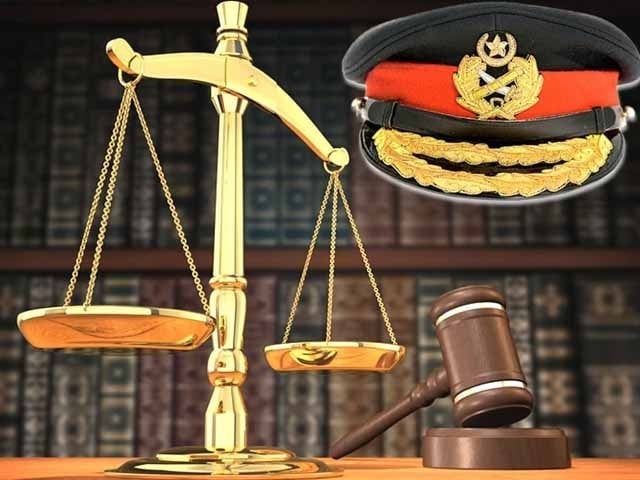- Web Desk
- Feb 19, 2026
Civil-military trial: SC reserves verdict, decision to be announced this week
-

- Web Desk
- May 05, 2025

ISLAMABAD: Following months of hearings in the civil-military trial case, the Supreme Court has finally reserved the verdict which will be announced later this week.
The bench has been presiding over an appeal case against declaring the trial of civilians in military courts null and void. The seven-member constitutional bench headed by Justice Aminuddin has been hearing the case, and includes Justice Jamal Khan Mandokhail, Justice Musarrat Hilali, Justice Muhammad Ali Mazhar, Justice Hassan Azhar Rizvi, Justice Naeem Akhtar Afghan and Justice Shahid Bilal.
The SC resumed hearing on military trials of civilians amid May 9 debate with Attorney General Pakistan (AGP) Mansoor Usman Awan presenting his concluding arguments.
Awan vigorously defended the government’s stance, describing the violent protests of May 9, 2023 — triggered by the arrest of former prime minister Imran Khan — as “criminal acts” that warranted exceptional legal response. He told the court that the violent unrest was unprecedented in scale and nature: “From 3pm till evening on May 9, coordinated attacks took place at 39 different locations across the country,” he said, stressing that the state had not witnessed such events even during the most repressive phases of its history.
SC resumes hearing of appeal case on military trials of civilians
Referring to historical precedents, Awan said even the execution of a former prime minister — a reference to Zulfikar Ali Bhutto — had not led to attacks of this kind.
“During the Movement for the Restoration of Democracy (MRD), all parties were banned. Its leadership was jailed. Air Marshal Asghar Khan remained under house arrest for over three years — yet no one resorted to such acts. Even if the May 9 violence was a reaction, it cannot be justified,” he said.
He maintained that Pakistan faced persistent security threats due to its geography and that the events of May 9 could not be treated as ordinary political dissent.
Judicial scrutiny of army’s internal action
In an apparent effort to show that the military had taken responsibility where appropriate, the AGP revealed that internal disciplinary action was also taken against senior officers over negligence during the Jinnah House attack in Lahore: “Three senior officers — a lieutenant general, a brigadier, and a lieutenant colonel — were prematurely retired without pension or benefits,” he said, adding that the performance of 14 other officers was deemed unsatisfactory and they were denied further promotions.
Justice Jamal Khan Mandokhail, however, questioned whether any criminal proceedings were initiated.
“Criminal proceedings happen when a crime is committed,” Awan replied, explaining that the internal action was due to failure to prevent the incident, not for committing a crime.
But Justice Mandokhail persisted that under the Army Act, departmental action may be followed by criminal liability.
Judges challenge AGP on legal and historical grounds
Justice Syed Hasan Azhar Rizvi noted that in the aftermath of Bhutto’s hanging, people had resorted to extreme forms of protest, including self-immolation — but had not attacked state property.
The AGP said his own father had faced politically motivated cases as an activist, but damaging public property had never been considered a legitimate form of protest.
Constitutional Bench delves deeper into Army Act, civilians’ trials in military court
Justice Musarrat Hilali questioned whether the gate to Lahore’s Jinnah House had been broken open or opened from the inside — raising the possibility of internal collusion: “If it was opened from the inside, that would constitute collusion.”
Awan promised to verify and report back and Justice Mandokhail further probed the intent behind the attacks. The AGP maintained, “What happened on May 9 was a criminal act.”
‘You are on the wrong track’: Justice Afghan warns AGP
Justice Naeem Akhtar Afghan took a firm tone with the AGP, cautioning him against delving into the merits of the May 9 incident during a hearing meant to examine the constitutionality of military trials. “You are on the wrong track,” he said. “We have not permitted anyone to argue the merits of the May 9 incident — doing so could affect ongoing trials and appeals.”
He added that if the court ventured into specifics, it would raise more questions — many of which, he said, the AGP would likely be unable to answer.
Justice Afghan also confirmed with the AGP that the general retired without pension was, in fact, the Lahore corps commander. “Has he testified in trial court?” he asked. Awan responded that it would become clear when the appeal reaches the court, to which Justice Afghan said that was exactly his point as to how the route cannot be taken because Awan failed to answer.
Appeals underway
The AGP informed the court that 86 individuals convicted by military courts had already filed appeals, and the government would allow others to do so within an extended deadline.
Justice Hilali observed that while the Constitution had been amended 26 times, it remained puzzling why no one had attempted to amend the Official Secrets Act, which governs much of the military’s legal authority.
The AGP complained of frequent interruptions during his submissions: “I had requested 45 minutes — 25 of those were consumed by questions from the bench. I had reserved 20 minutes just for Justice Mandokhail.”
In response, Justice Mandokhail said, “I have no personal interest here — I am only thinking about the future of the country.”
Following the arrest of former prime minister Imran Khan on May 9 2023, riots gripped the entire country with many military establishments facing the brunt. Those involved in the rampage were tried in military courts and were awarded punishments in December 2024; many have thus filed appeals as well.




